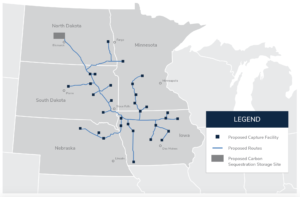The Trump administration is launching a $700 million initiative, potentially supplemented with corporate funding, to help farmers adopt regenerative agriculture practices. The pilot program will use $400 million from the…
Summit Carbon Pipeline Adds More Plants
Reuters’ Leah Douglas reported that “POET LLC, the world’s largest ethanol producer, on Monday said it will partner with Summit Carbon Solutions to capture carbon dioxide emissions at 17 of POET’s U.S. Midwest ethanol plants as part of Summit’s multi-state pipeline project.”
“Summit will capture and store 4.7 million metric tons of CO2 from 12 POET plants in Iowa and five plants in South Dakota, the companies said in a statement,” Douglas reported.
“The announcement comes just days after the grand opening of what is believed to be the world’s first sustainable aviation fuel plant in Soperton, Georgia,” Progressive Farmer’s Todd Neeley reported Monday. “Just last week, Iowa agriculture and biofuels officials called for widespread adoption of carbon capture and sequestration among Iowa ethanol plants to make the industry more attractive to SAF production.”
The Proposed Pipeline
Bloomberg’s Kim Chipman reported Monday that the POET plants will be part of a larger pipeline that Summit is proposing to build “through five states — Iowa, Minnesota, Nebraska, South Dakota and North Dakota — to carry 18.5 million metric tons of carbon dioxide a year. Ethanol from plants that feed into the pipeline could replace 25% of all US aviation fuel with SAF.”
“Poet’s plants will add 380 miles (610 kilometers) to Summit’s planned pipeline, which is expected to start operating in early 2026, bringing total length to about 2,200 miles,” Chipman wrote.

“The addition of the Poet plants to the pipeline would increase the number of plants connected to a future pipeline from about 30 to nearly 50,” Neeley reported.
Regulatory Challenges
While POET and Summit Carbon Solutions have announced their plans to work together, the project is far from a sure thing and still faces a number of regulatory hurdles that have plagued both Summit’s project and other proposed carbon capture projects in the Midwest in recent months.
For example, “POET previously partnered with another carbon pipeline project proposed by Navigator CO2 Ventures to use carbon capture and storage (CCS) to slash the emissions of its ethanol production and help meet its climate goals,” Douglas reported. “Navigator canceled its project in October, citing a challenging state regulatory environment.”
Neeley reported Monday that “Poet originally planned to connect 18 ethanol plants to the Navigator pipeline.”
In addition, Neeley reported that “the Summit project has faced several regulatory challenges in the past year or so” and that “after Navigator CO2 Ventures canceled a planned carbon pipeline in October 2023, Summit announced it was delaying its project by two years to 2026.”
Summit has also faced other hurdles, including in early August when “the North Dakota Public Service Commission unanimously denied a siting permit for the project that would traverse through Iowa, Minnesota, Nebraska, South Dakota and North Dakota,” Neeley wrote.
“In rejecting a site permit, the North Dakota Public Service Commission cited a U.S. Geological Survey that found 14 areas of potential geological instability within the project corridor,” Neeley wrote.
South Dakota has also denied an application from Summit, “citing safety concerns and the landowner opposition,” Douglas wrote. “Summit plans to refile its application. The company is awaiting a permit decision from state utility regulators in Iowa.”
While the project faces it fair share of challenges, Poet’s president believes that ““Tailwinds are starting to get behind this project,’ he said,” according to Chipman’s reporting. “‘Farmers have been doing a good job of getting engaged and understanding: ‘Hey, if we don’t get behind this, what are we missing out on?’”





